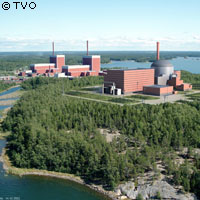EU launches Sustainable Nuclear Energy Technology Platform
Nuclear energy has won a place in the EU's low-carbon energy mix following the launch of a new forum for nuclear energy research by the European Commission and the French Atomic Energy Commission (CEA). The Sustainable Nuclear Energy Technology Platform will bring together researchers and industry to define a Strategic Research Agenda (SRA) and Deployment Strategy, with the goal of maintaining European leadership in this vital sector. Europe currently has the largest nuclear industry in the world, with one-third of its electricity coming from nuclear plants. With worldwide energy consumption likely to double between 2000 and 2050, nuclear energy will remain a key element in future low-carbon energy systems. A vision document outlining how the sector should develop in the future was unveiled at a stakeholder meeting in Brussels to officially launch the new European Technology Platform (ETP) on 21 September. The ETP's main goal will be to develop a fully integrated approach to nuclear energy research within Europe. 'For those countries that choose it, nuclear power will be a very important part of their solution to security of supply and reduction of greenhouse gases,' said EU Science and Research Commissioner Janez Potocnik at the launch of the Platform. 'It is clear that we need to address two important concerns - ensuring that nuclear power is economically competitive and, more importantly, our duty to make it as neutral as possible in environmental terms and in terms of the legacy we leave future generations,' Mr Potocnik added. Research and development (R&D) and innovation will be Europe's tools for addressing these concerns, said the Commissioner. Studies will address a significant reduction in nuclear waste, as well as sound ways of recycling or storing it. The European Technology Platform will bring together all nuclear energy stakeholders to implement their vision of how the sector should develop in the short-, mid- and long-term, identifying the research needed to make that vision a reality. It will provide expert advice and recommendations to the European Commission and national governments to help define and concentrate the efforts and budgets on priorities agreed at EU level. In this way, the EU hopes that it will reinforce the European scientific base, while fostering dialogue on key issues such as management of waste and safety, and the protection of populations against radiological hazards. This is essential in order to reassure the public that these issues are being addressed appropriately. One of the partners in the Platform is the French Atomic Energy Commission, the CEA, which has a long history of involvement in nuclear research and is at the forefront of technological development in the field as it works on fourth generation nuclear reactors. According to its Administrator General, Alain Bugat, the CEA will have an ¿open and cooperative approach¿ within the new platform. The idea behind the platform is that we will achieve more by cooperating than working as individual Member States. So, the CEA is ready to share its knowledge with partners, including the results of its research into nuclear waste, as well as its infrastructures and future constructions such as the fourth generation prototype reactors. The platform forms part of the Commission's wider Strategic Energy Technology Plan (SET Plan) to promote EU R&D efforts on low-carbon technologies, due to be published at the end of 2007.



